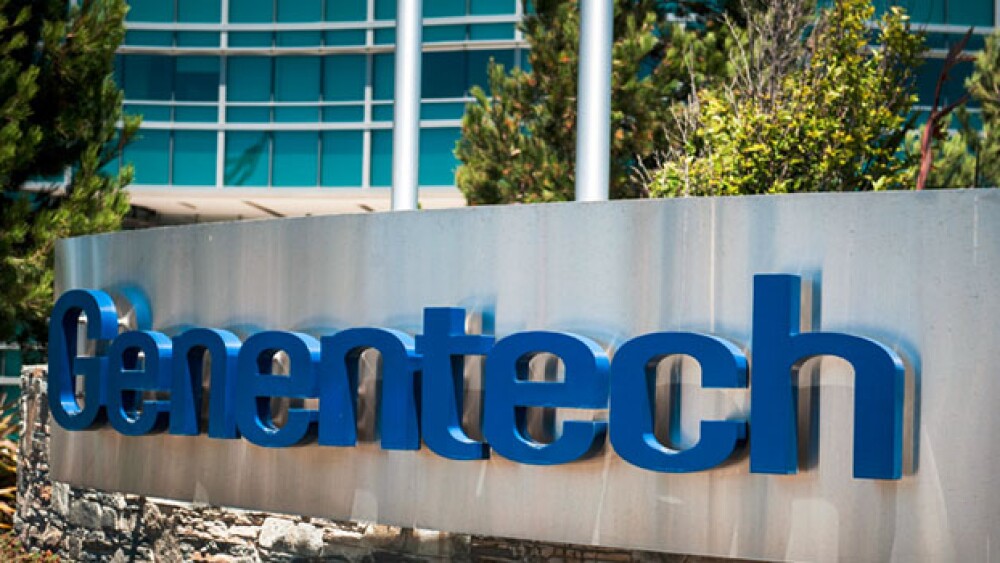This approval marks the first new initial treatment option for this difficult-to-treat type of lung cancer in more than 20 years.
Genentech’s Tecentriq has picked up its second regulatory approval this month from the U.S. Food and Drug Administration (FDA). Late Monday the regulatory agency approved Tecentriq in combination with chemotherapy (carboplatin and etoposide) for the initial treatment of adults with extensive-stage small cell lung cancer.
This approval marks the first new initial treatment option for this difficult-to-treat type of lung cancer in more than 20 years. The latest approval for Tecentriq, an anti-PDL1 inhibitor, was based on results from the Phase III IMpower133 study, which showed that Tecentriq in combination with chemotherapy helped people with this disease live significantly longer compared to chemotherapy alone. That was the first Phase III study to show an immunotherapy-based combination significantly improved overall survival as an initial treatment for people with ES-SCLC, 12.3 months versus 10.3 months. In addition to improving overall survival, Genentech said the combination also improved progression-free survival in the same patients.
Safety for the Tecentriq and chemotherapy combination appeared consistent with the known safety profile of the individual medicines, and no new safety signals were identified with the combination, Genentech said.
“Tecentriq is the first cancer immunotherapy approved for the initial treatment of extensive-stage small cell lung cancer, which is especially difficult to treat,” Sandra Horning, chief medical officer and head of Global Product Development at Genentech said in a statement. “Until now, there have been limited treatment advances for this disease, and we are excited to bring a potential new standard of care to patients that has been shown to improve survival compared to chemotherapy.”
Monday’s approval is the second for Tecentriq this month. Less than 10 days ago, the FDA approved Tecentriq plus chemotherapy for the treatment of adults with PD-L1-positive, metastatic triple-negative breast cancer. In that case, Tecentriq was granted accelerated approval based on progression-free survival. Data from the Phase III IMpassion130 trial, showing that Tecentriq plus nab-paclitaxel significantly cut the risk of PFS by 40 percent compared with nab-paclitaxel alone in PD-L1-positive patients with triple-negative breast cancer who hadn’t received previous chemotherapy.
According to the American Cancer Society, more than 228,000 Americans are expected to be diagnosed with lung cancer this year. About 84 percent will be diagnosed with non-small cell lung cancer, the most prevalent type. The rest will likely fall into small cell lung cancer. The majority (approximately 70 percent) of people with SCLC are diagnosed with ES-SCLC, for which Tecentriq received the latest approval. The five-year survival rate for patients diagnosed in the United States with any stage of lung cancer is estimated to be 18 percent. Overall survival is a key selling point for lung cancer treatments.
Andrea Ferris, president and chief executive officer of LUNGevity Foundation, noted that extensive-stage small cell lung cancer is a highly aggressive form of lung cancer that has not seen many treatment advances in the past two decades.
“Today’s approval of Tecentriq is an important step forward in ensuring that people across the spectrum of lung cancer types have effective new therapies,” Ferris said in a statement.
Tecentriq is also approved in combination with Avastin, paclitaxel and carboplatin, as a first-line treatment of adults with metastatic non-squamous NSCLC with no EGFR or ALK genomic tumor aberrations. Additionally, Tecentriq is approved by the FDA to treat adults with metastatic NSCLC who have disease progression during or following platinum-containing chemotherapy.





